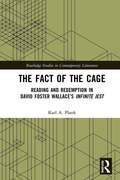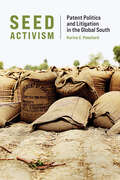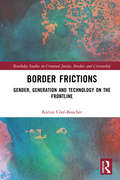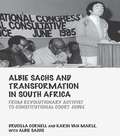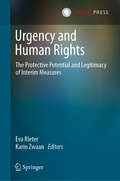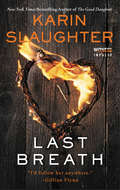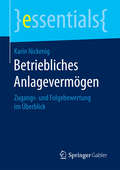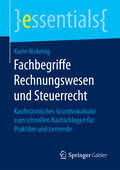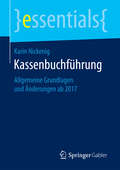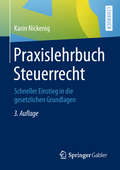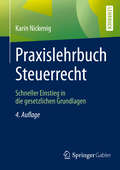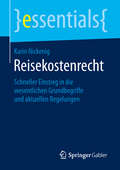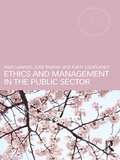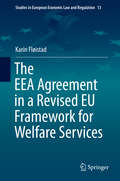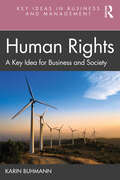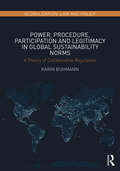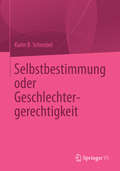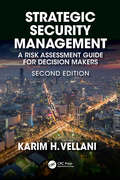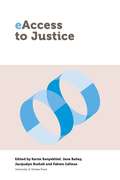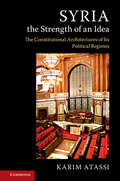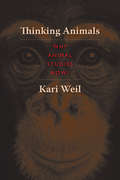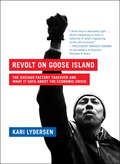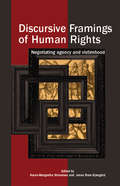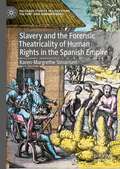- Table View
- List View
The Fact of the Cage: Reading and Redemption In David Foster Wallace’s "Infinite Jest" (Routledge Studies in Contemporary Literature)
by Karl A. PlankDavid Foster Wallace’s Infinite Jest raised expectations of what a novel might do. As he understood fiction to aim at what it means to be human, so he hoped his work might relieve the loneliness of human suffering. In that light, The Fact of the Cage shows how Wallace’s masterpiece dramatizes the condition of encagement and how it comes to be met by "Abiding" and through inter-relational acts of speaking and hearing, touching, and facing. Revealing Wallace’s theology of a "boneless Christ," The Fact of the Cage wagers that reading such a novel as Infinite Jest makes available to readers the redemption glimpsed in its pages, that reading fiction has ethical and religious significance—in short, that reading Infinite Jest makes one better. As such, Plank’s work takes steps to defend the ethics of fiction, the vital relation between religion and literature, and why one just might read at all.
Seed Activism: Patent Politics and Litigation in the Global South (Food, Health, and the Environment)
by Karine E. PeschardHow lawsuits around intellectual property in Brazil and India are impacting the patentability of plants and seeds, farmers&’ rights, and the public interest.Over the past decade, legal challenges have arisen in the Global South over patents on genetically modified crops. In this ethnographic study, Karine E. Peschard explores the effects of these disputes on people&’s lives, while uncovering the role of power—material, institutional, and discursive—in shaping laws and legal systems. The expansion of corporate intellectual property (IP), she shows, negatively impacts farmers&’ rights and, by extension, the right to food, since small farms produce the bulk of food for domestic consumption. Peschard sees emerging a new legal common sense concerning the patentability of plant-related inventions, as well as a balance among IP, farmers&’ rights, and the public interest.Peschard examines the strengthening of IP regimes for plant varieties, the consolidation of the global biotech industry, the erosion of agrobiodiversity, and farmers&’ dispossession. She shows how litigants question the legality of patents and private IP systems implemented by Monsanto for royalties on three genetically modified crop varieties, Roundup Ready soybean in Brazil and Bt cotton and Bt eggplant in India. Peschard argues that these private IP systems have rendered moot domestic legislation on plant variety protection and farmers&’ rights. This unprecedented level of corporate concentration in such a vital sector raises concerns over the erosion of agricultural biodiversity, farmers&’ rights and livelihoods, food security, and, ultimately, the merits of extending IP rights to higher life forms such as plants.
Border Frictions: Gender, Generation and Technology on the Frontline (Routledge Studies in Criminal Justice, Borders and Citizenship)
by Karine Côté-BoucherHow did Canadian border officers come to think of themselves as a "police of the border"? This book tells the story of the shift to law enforcement in Canadian border control. From the 1990s onward, it traces the transformation of a customs organization into a border-policing agency. Border Frictions investigates how considerable political efforts and state resources have made bordering a matter of security and trade facilitation best managed with surveillance technologies. Based on interviews with border officers, ethnographic work carried out in the vicinity of land border ports of entry and policy analysis, this book illuminates features seldom reviewed by critical border scholars. These include the fraught circulation of data, the role of unions in shaping the border policy agenda, the significance of professional socialization in the making of distinct generations of security workers and evidence of the masculinization of bordering. In a time when surveillance technologies track the mobilities of goods and people and push their control beyond and inside geopolitical borderlines, Côté-Boucher unpacks how we came to accept the idea that it is vital to deploy coercive bordering tactics at the land border. Written in a clear and engaging style, this book will appeal to students and scholars in criminology, sociology, social theory, politics, and geography and appeal to those interested in learning about the everyday reality of policing the border.
Forming a Culture of Peace
by Karina V. KorostelinaThis book challenges the discourses, narrative frames, and systems of beliefs that support and promote violence and conflict, it defines new comprehensive approaches to human security as preventative and empowering to individuals, and it provides conceptual frameworks and methodological tools for enhancing the processes of communicating peace.
Albie Sachs and Transformation in South Africa: From Revolutionary Activist to Constitutional Court Judge (Birkbeck Law Press)
by Albie Sachs Drucilla Cornell Karin van MarleMany critical theorists talk and write about the day after the revolution, but few have actually participated in the constitution of a revolutionary government. Emeritus Justice Albie Sachs was a freedom fighter for most of his life. He then played a major role in the negotiating committee for the new constitution of South Africa, and was subsequently appointed to the new Constitutional Court of South Africa. Therefore, the question of what it means to make the transition from a freedom fighter to a participant in a revolutionary government is not abstract, in Hegel’s sense of the word, it is an actual journey that Albie Sachs undertook. The essays in this book raise the complex question of what it actually means to make this transition without selling out to the demands of realism. In addition, the preface written by Emeritus Justice Albie Sachs and his interview with Drucilla Cornell and Karin van Marle, further address key questions about revolution in the twentieth- and twenty-first centuries: from armed struggle to the organization of a nation state committed to ethical transformation in the name of justice. Albie Sachs and transformation in South Africa: from revolutionary activist to constitutional court judge illuminates the theoretical and practical experiences of revolution and its political aftermath. With first-hand accounts alongside academic interrogation, this unique book will intrigue anyone interested in the intersection of Law and Politics.
Urgency and Human Rights: The Protective Potential and Legitimacy of Interim Measures
by Karin Zwaan Eva RieterThis book deals with urgency and human rights. ‘Urgent’ is a word often used, in very different contexts. Yet together with a reference to human rights violations, it likely triggers images of people caught up in armed conflict, facing terror from either the state, gangs, paramilitaries, or terrorists. Or of people fleeing terror and facing walls, fences or seas, at risk of being returned to terror, or ignored, neglected, abused, deprived of access to justice and basic facilities, facing death, torture and cruel treatment. Here these both ongoing and expected violations are explored in the context of (quasi-)judicial proceedings as international tribunals and domestic courts are increasingly called upon to order interim measures or accelerate proceedings in such cases. This edited volume concerns the protective potential of interim measures in international human rights cases and the legitimacy of their use and discusses obstacles to their persuasive use, to clarify how their legitimacy and protective potential could be enhanced in the context of concrete legal cases. Examining this is especially pressing when courts and (quasi-)judicial bodies have used interim measures in response to requests by individuals and organisations in the context of issues that are unpopular with governments and/or controversial within society, which has led states to at times employ political pressure to limit their use. Urgency and human rights are discussed from the vantage point of various practitioners and scholars, with the aim of identifying how interim measures could be legitimate and protective and to single out obstacles to their implementation. Drawing from practices developed in various international and regional adjudicatory systems, the contributors provide their perspectives on the legitimacy and/or the protective potential of interim measures and other (quasi-)judicial proceedings in urgent human rights cases. There is considerable discussion about how interim measures can be legitimate and well-functioning tools to address urgent human rights cases. This book aims to contribute to the ongoing discussion in this respect. Dr. Eva Rieter is senior researcher and lecturer public international law and human rights law at the Centre for State and Law, Radboud University, Nijmegen, The Netherlands. Dr. Karin Zwaan is associate professor in the Department of Migration Law at the Centre for State and Law, Radboud University, Nijmegen, The Netherlands.
Last Breath
by Karin SlaughterProtecting someone always comes at a cost.At the age of thirteen, Charlie Quinn’s childhood came to an abrupt and devastating end. Two men, with a grudge against her lawyer father, broke into her home—and after that shocking night, Charlie’s world was never the same.Now a lawyer herself, Charlie has made it her mission to defend those with no one else to turn to. So when Flora Faulkner, a motherless teen, begs for help, Charlie is reminded of her own past, and is powerless to say no.But honor-student Flora is in far deeper trouble than Charlie could ever have anticipated. Soon she must ask herself: How far should she go to protect her client? And can she truly believe everything she is being told?Razor-sharp and lightning-fast, this electrifying story from the #1 international bestselling author will leave you breathless. And be sure to read Karin Slaughter’s extraordinary new novel The Good Daughter—available August 22, 2017.
Betriebliches Anlagevermögen: Zugangs- und Folgebewertung im Überblick (essentials)
by Karin NickenigKarin Nickenig befasst sich in diesem essential mit der Zusammensetzung des Anlagevermögens sowie der Zugangs- und Folgebewertung von Anlagegütern. Der Band ermöglicht einen schnellen Überblick hinsichtlich möglicher Abschreibungen. Die Betrachtung von Geringwertigen Wirtschaftsgütern und relevanten Vorschriften zur Umsatzsteuer/Vorsteuer ist ein weiterer wesentlicher Bestandteil dieser Lektüre.
Fachbegriffe Rechnungswesen und Steuerrecht: Kaufmännisches Grundvokabular zum schnellen Nachschlagen für Praktiker und Lernende (essentials)
by Karin NickenigKarin Nickenig befasst sich in diesem essential in aller K#65533;rze mit den wesentlichen Fachbegriffen aus der Buchf#65533;hrung und Kostenrechnung (Rechnungswesen), sowie einschl#65533;gigem Fachvokabular aus dem Steuerrecht (insb. Einkommen-, Umsatz- und Gewerbesteuer). Der Leser erh#65533;lt mit Hilfe dieses praxisorientierten kleinen Nachschlagewerks einen einfachen, dennoch fundierten Einstieg in relevante Begriffsdefinitionen, welche zum beruflichen Alltag z. B. eines kaufm#65533;nnischen Angestellten oder Unternehmers geh#65533;ren. Die Anordnung in alphabetischer Reihenfolge erleichtert das Auffinden der Begriffe im Praxisalltag ,,auf die Schnelle".
Kassenbuchführung: Allgemeine Grundlagen und Änderungen ab 2017 (essentials)
by Karin NickenigKarin Nickenig befasst sich in diesem essential in aller Kürze mit den aktuell bestehenden Regelungen zur Kassenbuchführung und den geplanten Änderungen ab dem Jahr 2017 durch das Gesetz zum Schutz vor Manipulationen an digitalen Grundaufzeichnungen („Kassengesetz“). Mit Hilfe dieses essentials erhält der Praktiker einen Überblick über die stets fortschreitende Komplexität der Regelungen zur Kassenbuchführung.
Praxislehrbuch Steuerrecht: Schneller Einstieg in die gesetzlichen Grundlagen
by Karin NickenigDieses Praxislehrbuch bietet einen leichten und nachvollziehbaren Überblick über die gesetzlichen Grundlagen der Einkommen-, Umsatz-, Gewerbe- und Körperschaftssteuer für den unternehmerischen Alltag, in dem Existenzgründer, Selbstständige und kaufmännische Angestellte täglich mit steuerrechtlichen Fragen und Herausforderungen konfrontiert werden. Die neu erworbenen oder aufgefrischten Kenntnisse werden mithilfe zahlreicher Beispiele, Kontrollfragen und Übungen mit detaillierten Lösungen vertieft. So gewinnen Kleingewerbetreibende und Jungunternehmer den nötigen Einblick in die für sie relevanten steuerlichen Zusammenhänge und entschlüsseln das Fachvokabular von Behörden und Steuerberatern. Die 3. Auflage wurde sorgfältig durchgesehen, aktualisiert und optimiert.
Praxislehrbuch Steuerrecht: Schneller Einstieg in die gesetzlichen Grundlagen
by Karin NickenigDieses Praxislehrbuch bietet einen leichten und nachvollziehbaren Überblick über die gesetzlichen Grundlagen der Einkommen-, Umsatz-, Gewerbe- und Körperschaftssteuer für den unternehmerischen Alltag, in dem Existenzgründer, Selbstständige und kaufmännische Angestellte täglich mit steuerrechtlichen Fragen und Herausforderungen konfrontiert werden. Die neu erworbenen oder aufgefrischten Kenntnisse werden mithilfe zahlreicher Beispiele, Kontrollfragen und Übungen mit detaillierten Lösungen vertieft. So gewinnen Kleingewerbetreibende und Jungunternehmer den nötigen Einblick in die für sie relevanten steuerlichen Zusammenhänge und entschlüsseln das Fachvokabular von Behörden und Steuerberatern. Die aktualisierte 4. Auflage wurde auf den Rechtsstand Sommer 2019 gebracht.
Reisekostenrecht: Schneller Einstieg in die wesentlichen Grundbegriffe und aktuellen Regelungen (essentials)
by Karin NickenigIm Mittelpunkt dieses essentials steht die anschauliche und fundierte Darstellung gesetzlicher Regelungen im Reisekostenrecht (inkl. Bundesreisekostengesetz). Zahlreiche Beispiele bringen dem Leser, der im Vorfeld noch nichts oder wenig mit dieser Materie zu tun hatte oder sich schnell einen Einblick in die aktuelle Zahlenwelt verschaffen möchte, die Zusammensetzung der Reisekosten (z.B. Fahrtkosten, Verpflegungsmehraufwendungen, Reisenebenkosten) nahe. Das essential ersetzt nicht die Kommunikation mit dem Steuerberater, sondern unterstützt den Angestellten dabei, aktuelle Grundkenntnisse im Reisekostenrecht zu erwerben bzw. diese zu vertiefen. Ziel ist es, die erworbenen Kenntnisse in der Praxis sicher anwenden zu können.
Ethics and Management in the Public Sector (Masters in Public Management)
by Alan Lawton Julie Rayner Karin LasthuizenGrappling with ethical issues is a daily challenge for those working in organizations that deliver public services. Such services are delivered through an often bewildering range of agencies and amidst this constant change, there are fears that a public service ethos, a tradition of working in the public interest, becomes blurred. Using extensive vignettes and case studies, Ethics and Management in the Public Sector illuminates the practical decisions made by public officials. The book takes a universal approach to ethics reflecting the world-wide impact of public service reforms and also includes discussions on how these reforms impact traditional vales and principles of public services. This easy-to-use textbook is a definitive guide for postgraduate students of public sector ethics, as well as students of public management and administration more generally.
The EEA Agreement in a Revised EU Framework for Welfare Services (Studies in European Economic Law and Regulation #13)
by Karin FløistadThis book addresses some of the most debated topics preceding the UK referendum on membership of the EU, namely welfare services and free movement of citizens. The work improves understanding of the implications of the European Economic Area (EEA) Agreement, which is the most integrated form of association agreement with the EU for non-member states. The author considers the impact of EEA law on both European Free Trade Association (EFTA) states and on EU Member States, and looks at case law. A broad range of welfare services are analysed, including public healthcare and educational services, various social services, and public utilities such as transport and public broadcasting. Free movement of students, of patients and public financing of welfare services are among the issues explored. The focus here is particularly on legal aspects and the demonstrated development of the EEA Agreement into the welfare sphere. This work enables a sophisticated analysis about the nature of the principles of homogeneity and dynamism. The book is essential reading for scholars who seek to understand the EU’s legal framework, the EEA Agreement and its implications. The topics covered are also relevant to UK/EU discussions on future relations, both for intermediate and long-term arrangements.
Human Rights: A Key Idea for Business and Society (Key Ideas in Business and Management)
by Karin BuhmannHuman rights is an interdisciplinary subject as well as a foundational aspect of the law. The importance of human rights at the intersection of business and society is central, yet under-analyzed. This book provides an accessible understanding of what human rights are, how business enterprises may impact human rights for better or for worse, and how such impacts can or should be managed. Human Rights: A Key Idea for Business and Society equips readers interested in the relationship between business and society with the foundational knowledge for engaging in debates and operational tasks related to the roles and responsibilities of business with regard to human rights. It covers human rights aspects relevant to common management tasks, including supply chain management, human resource management, risk management, non-financial reporting, finance, and stakeholder engagement. It covers opportunities and challenges related to the Sustainable Development Goals (SDGs) and climate change mitigation. The book explains the foundations for human rights, social expectations, and legal requirements on businesses to respect human rights and how business enterprises should identify and manage their human rights impacts. A concise introduction to a complex topic, this book is perfect reading for students of corporate social responsibility, business ethics, and international business, as well as an illuminating guide for researchers, managers, civil society organizations, government officials, and reflective practitioners.
Power, Procedure, Participation and Legitimacy in Global Sustainability Norms: A Theory of Collaborative Regulation (Globalization: Law and Policy)
by Karin BuhmannGlobalisation of the market, law and politics contributes to a diversity of transnational sustainability problems whose solutions exceed the territorial jurisdictional limits of nation states in which their effects are generated or occur. The rise of the business sector as a powerful global actor with a claim to participation and potential contributions as well as adverse impacts sustainability complicates the regulatory challenge. Recent decades’ efforts to govern transitions towards sustainability through public or hybrid regulation display mixed records of support and results. In combination, these issues highlight the need for insights on what conditions multi-stakeholder regulation for a process that balances stakeholder power and delivers results perceived as legitimate by participants and broader society. This book responds to that need. Based on empirical experience on public-private regulation of global sustainability concerns and theoretical perspectives on transnational regulation, the book proposes a new theory on collaborative regulation. This theory sets out a procedural approach for multi-stakeholder regulation of global sustainability issues in a global legal and political order to provide for legitimacy of process and results. It takes account of the claims to participation of the private sector as well as civil society organisations and the need to balance power disparities.
Selbstbestimmung oder Geschlechtergerechtigkeit
by Karin B. SchnebelSelbstbestimmung und Gerechtigkeit sind zwar allgemeine Wertvorstellungen, die jedoch in Konflikt zueinander geraten können. Auch das Ziel einer geschlechtergerechten Gesellschaft berührt dieses Spannungsfeld, da die Strategie gescheitert ist, Geschlechtergerechtigkeit über eine Ausblendung geschlechtlicher Unterschiede zu erreichen. Zwar ist es gelungen, Frauen stärker in der öffentlichen Sphäre zu verankern, doch kann ihre zivilisationsgeschichtlich starke Einbindung in das Private nicht übergangen werden. Die andere denkbare Möglichkeit Geschlechtergerechtigkeit herzustellen, ist die Anerkennung und Aufwertung der privaten, weiblich dominierten Sphäre. Hier wird gezeigt, dass eine Aufwertung des Privaten nur über eine stärkere Einmischung des Öffentlichen, also der Politik, in das Private geschehen kann, was zu einem Verlust von Autonomie führt. Es wird herausgearbeitet, dass die derzeitige Politik dabei ist, Frauen wieder stärker zu diskriminieren. Damit stellt sich die Frage: Wie kann ein liberaler Staat Geschlechtergerechtigkeit erreichen, ohne Werte wie Freiheit, Autonomie oder Selbstbestimmung zu gefährden?
Strategic Security Management: A Risk Assessment Guide for Decision Makers, Second Edition
by Karim VellaniStrategic Security Management, Second Edition provides security leadership and decision-makers with a fresh perspective on threat, vulnerability, and risk assessment. The book offers a framework to look at applying security analysis and theory into practice for effective security program, implementation, management and evaluation. Chapters examine metric-based security resource allocation of countermeasures, including security procedures, utilization of personnel, and electronic measures. The new edition is fully updated to reflect the latest industry best-practices and includes contributions from security industry leaders—based on their years of professional experience—including: Nick Vellani, Michael Silva, Kenneth Wheatley, Robert Emery, Michael Haggard. Strategic Security Management, Second Edition will be a welcome addition to the security literature for all security professionals, security managers, and criminal justice students interested in understanding foundational security principles and their application.
eAccess to Justice (Law, Technology and Media)
by Karim Benyekhlef, Jane Bailey, Jacquelyn Burkell & Fabien GélinasPart I of this work focuses on the ways in which digitization projects can affect fundamental justice principles. It examines claims that technology will improve justice system efficiency and offers a model for evaluating e-justice systems that incorporates a broader range of justice system values. The emphasis is on the complicated relationship between privacy and transparency in making court records and decisions available online. Part II examines the implementation of technologies in the justice system and the challenges it comes with, focusing on four different technologies: online court information systems, e-filing, videoconferencing, and tablets for presentation and review of evidence by jurors. The authors share a measuring enthusiasm for technological advances in the courts, emphasizing that these technologies should be implemented with care to ensure the best possible outcome for access to a fair and effective justice system. Finally, Part III adopts the standpoints of sociology, political theory and legal theory to explore the complex web of values, norms, and practices that support our systems of justice, the reasons for their well-established resistance to change, and the avenues and prospects of eAccess. The chapters in this section provide a unique and valuable framework for thinking with the required sophistication about legal change.
Syria, the Strength of an Idea: The Constitutional Architectures Of Its Political Regimes
by Christopher Sutcliffe Karim Atassi Jean MarcouThe Syrian crisis has confounded political leaders and experts who forecast a rapid fall of the regime. This monumental error of interpretation has had tragic consequences for the unfolding of the crisis and its slide into a frightful civil war with regional and international ramifications. <p><p>This book looks at Syrian reality in a new light. By analysing twenty-five constitutions and constitutional texts and proposing an innovative classification of the different political regimes that have shaped Syria over the last one hundred years, the author retraces the country's intense history and the persistence of a Syrian model defined by the Founding Fathers. If, on emerging from this war, Syria maintains its unity and gives itself a democratic regime reflecting its society, then the concept of Syria may find a new lease of life and Syria will once again be perceived as an idea full of promises.<p> Offers analyses of twenty-five Syrian constitutions (including draft constitutions and constitutional texts) and innovatively classifies the different political regimes during a one-hundred-year period.<p> Explains the causes of the Syrian crisis (obsolete political system, economic liberalization, deterioration of the social situation and unsolved regional issues), situating the war in Syria with its national and regional ramifications.<p> Retraces the persistence of the main elements of a Syrian model to help experts involved in the Syrian crisis to identify grounds that may facilitate a peaceful solution.<p>
Thinking Animals: Why Animal Studies Now?
by Kari WeilKari Weil provides a critical introduction to the field of animal studies as well as an appreciation of its thrilling acts of destabilization. Examining real and imagined confrontations between human and nonhuman animals, she charts the presumed lines of difference between human beings and other species and the personal, ethical, and political implications of those boundaries. Weil's considerations recast the work of such authors as Kafka, Mann, Woolf, and Coetzee, and such philosophers as Nietzsche, Heidegger, Derrida, Deleuze, Agamben, Cixous, and Hearne, while incorporating the aesthetic perspectives of such visual artists as Bill Viola, Frank Noelker, and Sam Taylor-Wood and the "visual thinking" of the autistic animal scientist Temple Grandin. She addresses theories of pet keeping and domestication; the importance of animal agency; the intersection of animal studies, disability studies, and ethics; and the role of gender, shame, love, and grief in shaping our attitudes toward animals. Exposing humanism's conception of the human as a biased illusion, and embracing posthumanism's acceptance of human and animal entanglement, Weil unseats the comfortable assumptions of humanist thought and its species-specific distinctions.
Revolt on Goose Island
by Kari LydersenRevised and updated, with a new afterword by the author"There is much talk about 'audacity' these days, but true chutzpah is when the workers take over the factory and take on the bank. Kari Lydersen's invaluable account of the Republic sit-down strike is an instruction manual for worker dignity."--Mike Davis, author of Buda's Wagon and City of QuartzDecember 5, 2008: It wasn't supposed to work like this. Days after getting a $45 billion bailout from the U.S. government, Bank of America shut down a line of credit that kept Chicago's Republic Windows & Doors factory operating. The bosses, who knew what was coming, had been sneaking machinery out in the middle of the night. They closed the factory and sent the workers home.Then something surprising happened: Republic's workers occupied the factory and refused to leave.Kari Lydersen, an award-winning reporter, tells the story of the factory takeover, elegantly transforming the workers' story into a parable of labor activism for the twenty-first century, one that concludes with a surprising and little-reported victory.From the Trade Paperback edition.
Discursive Framings of Human Rights: Negotiating Agency and Victimhood
by Karen-Margrethe Simonsen Jonas Ross KjaergardWhat does it mean to be a subject of human rights? The status of the subject is closely connected with the form and rhetoric of the framing discourse, and this book investigates the relationship between the status of the subject and the form of human rights discourse, in differing aesthetic and social contexts. Historical as well as contemporary declarations of rights have stressed both the protective and political aspects of human rights. But in concrete situations and conflictual moments, the high moral legitimacy of human rights rhetoric has often clouded the actual character of specific interventions, and so made it difficult to differentiate between the objects of humanitarian intervention and the subjects of politics. Critically re-examining this opposition – between victims and agents of human rights – through a focus on the ways in which discourses of rights are formed and circulated within and between political societies, this book elicits the fluidity of their relationship, and with it the shifting relation between human rights and humanitarianism. Analysing the symbolic framings of testimonies, disaster stories, atrocity tales, political speeches, and philosophical arguments, it thus establishes a relationship between these different genres and the political, economic, and legal dimensions of human rights discourse.
Slavery and the Forensic Theatricality of Human Rights in the Spanish Empire (Palgrave Studies in Literature, Culture and Human Rights)
by Karen-Margrethe SimonsenThis book is a study of the forensic theatricality of human rights claims in literary texts about slavery in the sixteenth and the nineteenth century in the Spanish Empire. The book centers on the question: how do literary texts use theatrical, multisensorial strategies to denunciate the violence against enslaved people and make a claim for their rights? The Spanish context is particularly interesting because of its early tradition of human rights thinking in the Salamanca School (especially Bartolomé de Las Casas), developed in relation to slavery and colonialism. Taking its point of departure in forensic aesthetics, the book analyzes five forms of non-narrative theatricality: allegorical, carnivalesque, tragicomic, melodramatic and tragic.
